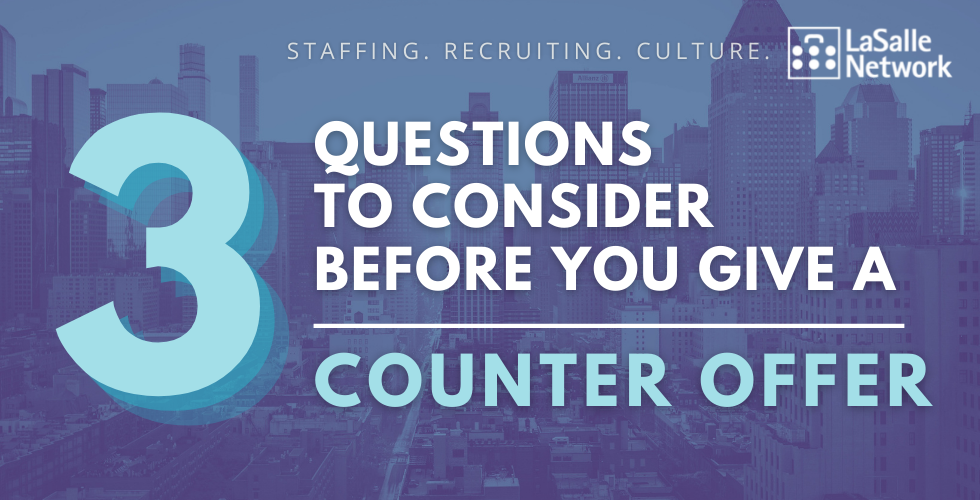One of your top performers steps into your office. You’re surprised to hear them inform you that they have another job offer on the table with a higher salary. Your first instinct may be to counteroffer, but is that really the best idea? There’s no denying losing a great employee can be tough (not to mention costly), and it’s tempting to do everything in your power to get them to stay. But before you counteroffer, here are 3 questions to consider:
Is this a long-term solution?
If your employee accepts your counter offer, will they be as fulfilled, engaged and productive as they were before? And is their future still bright with your organization? According to Forbes, the average employee stays with their employer less than 12 months after accepting a counter offer. It may put a band-aid on the situation, but in some instances, the fix is only temporary. This highlights that money may be only part of the reason your employee decided to look for another job.
While compensation is important, other issues like mismatched culture, career paths and commutes usually prompt people to start looking. It’s essential to ask yourself if a raise will really keep your employee happy and engaged in the long run.
However, if the employee’s future is bright, they’re an A-player on your team and you feel their concerns can be fixed, it’s worth prompting them to stay. Ask this person about the other opportunity and evaluate how it compares to what you can provide. If they’re seeking a new challenge, consider making changes to their role or offering more training. Then, make a counter offer and highlight the benefits of sticking around long-term.
What is the market offering?
Does your competition offer higher salaries than you do? Your employee may be happy with the culture and career path but feels under-valued because of their pay. In this case, it may be necessary to extend that counter offer. The raise will demonstrate that you value your employee’s work and can’t afford to lose them to the competition.
Conduct market research and analyze what other businesses are offering their employees. If the salaries you offer fall short, consider increasing wages for other members on your team, too. You’ll elevate morale and prevent similar situations from happening down the line.
How will this affect your relationship?
Now that you know your employee was trying to leave, think about how this will impact your relationship. Will you still be able to trust and depend on them like you did before? When counter offers are extended, “many managers begin to resent their former star employee,” according to Inc. This illustrates that while it may sound easier to entice this staff member stay, it can cause tension on the team.
But, while some employees will remain eager to jump ship, that’s not always the case. Every situation is unique. Harvard Business Review emphasizes the importance of listening to the employee and considering where they fit in terms of their value to the team and organization. If they love the culture, the leaders and the company’s mission, it may be worth finding a way for them to stay. Consider the employee’s contributions to the organization, their attitude and connection to the company before you make a final decision. No matter the outcome, demonstrating empathy and providing support will go a long way.
Looking for new talent? Let us help.





